This tip was provided by:
Calvin Trostle, Extension Agronomy, Lubbock, 806-746-6101, ctrostle@ag.tamu.edu
Statewide
Which Grain Sorghum Hybrids have Significant Apparent Tolerance/Resistance to Sugarcane Aphid?
Dr. Brent Bean, agronomist, United Sorghum Checkoff Program (and formerly Texas A&M AgriLife Extension agronomist, Amarillo), has compiled an initial list of grain sorghum hybrids that appear to have significant tolerance/resistance to sugarcane aphid (SCA). Some other hybrids may have a lesser degree of tolerance, but those are not listed. Dr. Bean has visited across the Sorghum Belt with companies, state university staff, farmers, etc. to arrive at this list as of Dec. 17, 2015. Producers should consult the USCP website, www.sorghumcheckoff.com, for possible updates beginning in early January.
Before I say anything else about how to use this list or how it was derived, know this: All commercial grain sorghum hybrids, including these listed below, have at least some level of susceptibility (and most are highly susceptible) to sugarcane aphid. All hybrids must be scouted, and at this time the same treatment thresholds apply to these hybrids as any other. No commercial hybrid is immune to SCA. Some Texas farmers made the mistake of assuming too much about the early purported tolerant hybrids in 2015, and they failed to treat SCA in timely fashion, or even scout their fields regularly if at all.
*Please note the following list is in alphabetical order by company and the order is not associated with believed tolerance levels.
Understand the Potential Caveats of this Initial List of SCA-Resistant/Tolerant Hybrids
- Much of the above information is derived only from seedling tests conducted in a controlled setting in a growth chamber or greenhouse. Real life conditions in your field are not a guarantee that the hybrid will demonstrate the same level of tolerance/resistance.
- Several of the above hybrids also have documented favorable reactions to SCA in field conditions, and additionally, there may be numerous reports from producers, Extension staff, field scouts, and crop consultants noting an individual hybrid performed well relative to other neighboring hybrids, etc. Dr. Bean notes that in most cases these hybrids have exhibited the ability to withstand higher infestation populations of SCA while retaining their yield potential, or SCA has been shown to increase in number much slower than in susceptible hybrids.
- You may hear a producer or other agriculturalist disagree with a hybrid being included on the above list. Know that these hybrids probably can’t tolerate/resist heavy SCA infestations on their own. For example, Dekalb DKS 37-07 has numerous documented and anecdotal observations of reduced SCA activity (not sprayed as soon, sprayed once instead of twice relative to other hybrids, not sprayed at all), but an elevator manager told me Dec. 16 that he thought that 37-07 had the same level of problems as any susceptible hybrid.
- Visit with the seed company about the hybrids you are interested in. Ask them what evidence they have for the hybrid’s tolerance/resistance. Seedling tests? Field observations? Field data? Do they have new information on any other hybrids?
- Regardless of a hybrid’s tolerance/resistance to SCA it is still critical to chose a hybrid based on its local adaptability and other favorable characteristics.
In our next Sorghum Tip in January we will provide a link to a summary of yield data comparisons for the above hybrids vs. trial averages from the Texas A&M AgriLife Crop Testing Program’s sorghum hybrid performance tests. (Most of the individual trial reports are already posted at http://varietytesting.tamu.edu/sorghum )
Texas Plant Disease Diagnostic Lab (TPPDL) vs. Direct Assessment by Sorghum Disease Experts
In our last Sorghum Tip we noted the services of TPPDL. Dr. Isakeit noted that this service lab is in part oriented toward horticultural assessments. You may wish to call your regional Texas AgriLife disease specialist (contact info. in previous Tip) to inquire if you might submit samples directly to Drs. Isakeit (College Station), Odvody (Corpus Christi), or French (Amarillo).









